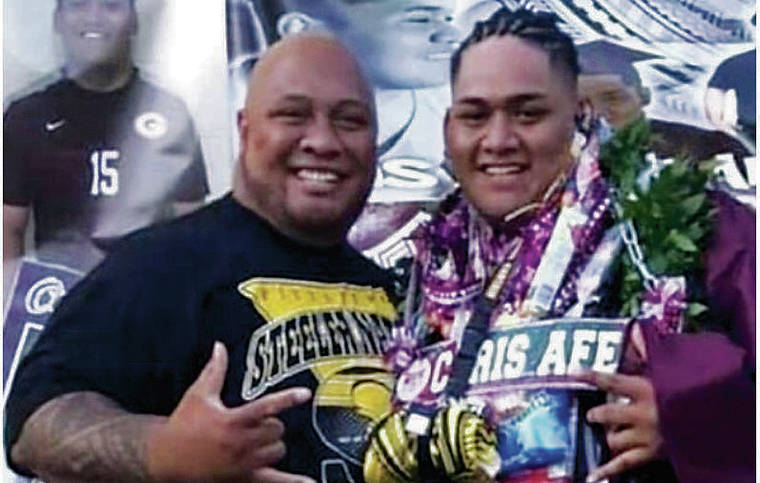COVID-19 victim Willie Talamoa was beloved Farrington football coach

COURTESY AFE FAMILY
Former Farrington assistant football coach Willie Talamoa, left, attended the graduation ceremonies of many former players, including Chris Afe, shown. Talamoa, 36, died from the coronavirus.
There has been an outpouring of love for former Farrington assistant football coach Willie Talamoa.
Talamoa, 36, was working as a guest services assistant at the Institute of Human Services homeless shelter when he died from the COVID-19 Opens in a new tabvirus Opens in a new tab. The news shocked his family and friends, in addition to the Kalihi football community.
“He was always supportive. Coaching was his passion, helping the kids of Kalihi,” former Farrington coach Randall Okimoto said.
Running back/linebacker Freedom Alualu was one of many who worked his way up from the Kalihi Disciples youth football team to Farrington under the watchful eye of Talamoa.
“He always put others first instead of himself. His support for us youth in Kalihi was like no other. I remember he used to pick up all the boys in his small silver Jeep just to go to practice, and there would be about seven to 10 of the boys squashed and bunched up in that small car,” Alualu recalled. “Not only was he my coach, but he was also my older brother.”
Talamoa played at McKinley, then spent time with his wife and daughter, as well as the Kalihi Disciples youth team. He coached special teams under Okimoto in 2015-17. There were plans to bring him back to the staff this fall to help with the junior varsity Governors under current varsity coach Daniel Sanchez.
Don't miss out on what's happening!
Stay in touch with breaking news, as it happens, conveniently in your email inbox. It's FREE!
“He was always a front-line guy right in the trenches,” Okimoto said. “Always willing to help, so it’s not surprising he was helping the homeless as well. He was very popular with the kids. He was the guy who put in the time in the offseason, be there with the kids.”
Talamoa worked in security at Dole Middle School and Farrington.
“He would help monitor the kids. That was helpful because a football team is so big,” Okimoto added. “You could count on him to be the in-between for us and the kids, us and the parents. Not too many coaches want to do that, but Willie wanted to do that. He never complained about it. ‘Coach, let me know, I’ll talk to them.’”
Okimoto last saw Talamoa when he worked at the Kapiolani Medical Center for Women and Children.
“I used to see him when I took my kid to the doctor’s appointment and he was right at the front desk,” Okimoto said.
Talamoa’s impact on players was powerful. Even young athletes who never played at the high school level paid tribute to Talamoa.
“I played outside league when he was coaching our Kalihi Disciples,” Junior Gafa said. “I’m thankful for the times I’ve had nothing, like literally nothing, he would get me whatever I needed out of his own pocket money. Not only for me, but for all the kids that came from the projects.”
One of his co-workers at IHS is Eddie Seumanu.
“He was a good brother and co-worker. I knew him for a few years and he’s one of the best guys and truly humble persons that care for the youth as well,” Seumanu said.
Seumanu will remember Talamoa’s compassion.
“It’s not an easy job, but we take pride in helping to make a difference in our community and helping the less fortunate,” Seumanu said. “There’s a lot of media coverage that hate on IHS and the homeless population but offer no support and no solution.”
A cousin, Tuli Tafai, also works in a higher-risk environment: Oahu Community Correctional Center. The cousins would bond by doing some trash-talking about high school football. Tafai has family playing at Campbell and other schools.
“He was continuing to encourage and care for those he came across at IHS. That’s the kind of guy he was. He was a great guy. He had a great spirit. He approached everything he did with love,” Tafai said. “I’m going to miss our little conversations and jabs we would give each other when Farrington and Campbell played.”
Okimoto’s first season as a head coach included a tough battle with McKinley.
“I remember him (Talamoa) as a player. My first year was 2002 as the head coach at Farrington. I remember him and his brother at McKinley. He was a linebacker or D-line. At that time, McKinley was pretty good. Every time I speak with him, I say, ‘You guys were so close.’ That’s when they lost to Castle in a double- or triple-overtime game. I remember being at that game. That’s the farthest I remember seeing McKinley go in a long, long time. He brought that mentality and winning attitude to Farrington.”



